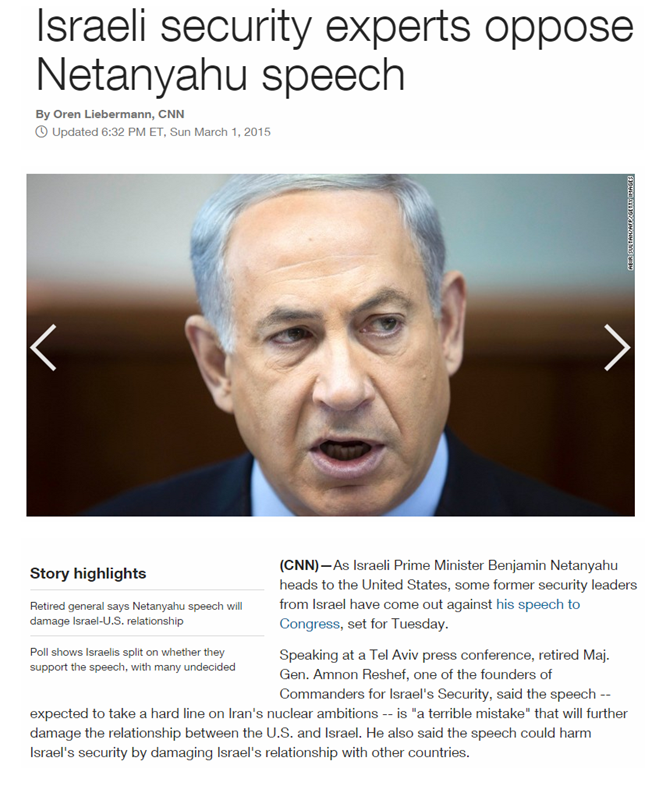Israeli experts oppose Netanyahu speech
On Friday, Meir Dagan, the former head of Israel’s intelligence agency, Mossad, told one of the leading Israeli newspapers, Yedioth Ahronoth: “The person who has caused the greatest strategic damage to Israel on the Iranian issue is the prime minister.”
Dagan, who was the director of Mossad from 2002 to 2010, continued, “I’ve seen leaders who made decisions and then later admitted that they had erred. Nobody is immune from mistakes. The difference between him and others is the willingness to take responsibility. He is strong on talk, not in action.”
Recent polling by CNN affiliate Channel 10 Israel shows Israelis split on the speech, with 38% supporting it and the same percentage opposing it. The remaining 24% are undecided.
But another poll from Panels Politics, an Israeli polling institute, indicates 53% of Israelis believe the speech will have no effect on the negotiations between six world powers and Iran over Tehran’s nuclear program. Another 30% believe the speech will affect the negotiations.
Reshef said this year’s elections, which will take place on March 17, exactly two weeks after Netanyahu’s speech, are crucial for the peace process.
Even after years of failed negotiations, Israel has the opportunity now to restart negotiations with the help of moderate Arab states, he said, while warning that going the wrong direction could push peace further out of reach. Reshef would not specify which political leaders would be the best for negotiations, but he said he trusts Israeli voters to decide for themselves in the upcoming elections.
Commanders for Israel’s Security is a nonpartisan group of nearly 200 veteran senior security members from the Israel Defense Forces; Shin Bet, Israel’s internal security agency; and the police. It is committed to a regional political-security initiative to resolve the Israeli-Palestinian conflict. The group also seeks to normalize relations with moderate Arab states such as Egypt, Saudi Arabia, Jordan and the United Arab Emirates.
related posts
-
Israeli Prime Minister Ehud Olmert’s Speech at Annapolis
11/27/2007 Speech translated from Hebrew [Emphasis added to show similarity to language demanded in OneVoice Mandate and to point out moments of particular leadership in speaking also to the other side] The Honorable President of the United States, George Bush, My colleague, President of the Palestinian Authority, Mahmoud Abbas, Heads of delegations, Distinguished guests, I [...]
-
Who is Blocking Movement on the Israeli-Syrian track?
Daniel Levy asserts (see his Point #4) that the Bush Administration is blocking negotiations that both the Syrian and Israeli Heads of State desire. He quotes Ambassador Martin Indyk (a member of our Honorary Board and a man who nobody would accuse of coming from the left) on his testimony to the House Foreign Relations [...]
-
ON NETANYAHU Speaking To Congress
Just hours after Netanyahu boarded a plane bound for Washington, the group of former generals and intelligence heads held a press conference in Tel Aviv where they stated that Netanyahu’s policies and upcoming speech to Congress were doing irreparable harm to U.S.-Israel relations and would do nothing to stop Iran’s nuclear program. “When the Israeli [...]
-
In their own words: Obama and Netanyahu
Over the last few weeks I have been receiving emails from all sorts of organizations trying to inspire fear about the Obama Administration’s policies towards Israel. From Obama’s efforts to drive towards a two-state solution, to Jordanian King Abdullah’s effort to expand the Arab Peace Initiative to encompass all 57 Muslim nations, it is disturbing [...]
-
Israeli Officials Visit with President Abbas in Ramallah
Yesterday, a delegation of Israeli politicians from the Caucus for Ending the Israeli-Arab Conflict traveled to the Mukata, the Palestinian Authority’s headquarters in Ramallah, to meet with Palestinian President Mahmoud Abbas. OneVoice helped organize the meeting, which followed the successful July 31 visit, where Palestinian officials came to the Israeli parliament as a sign of [...]














Comments are closed.